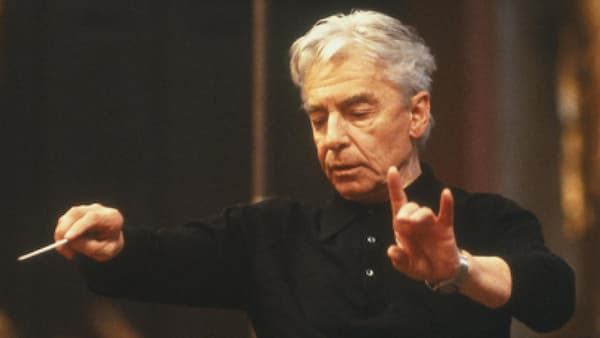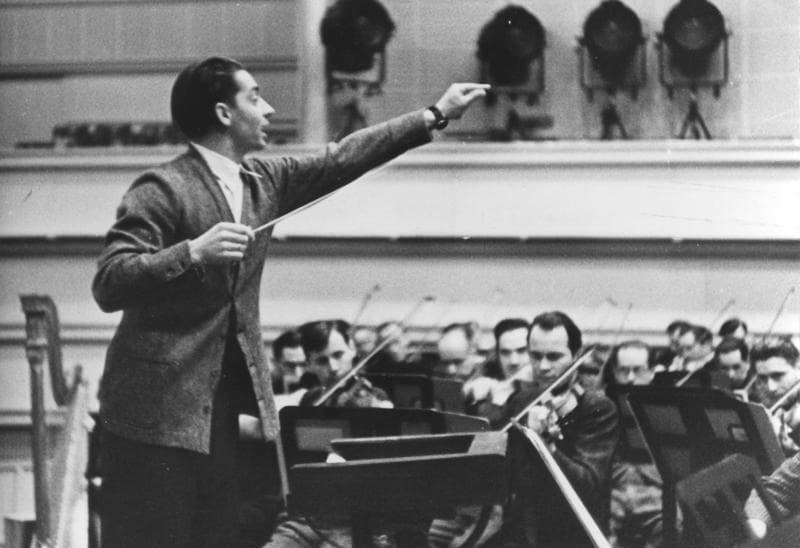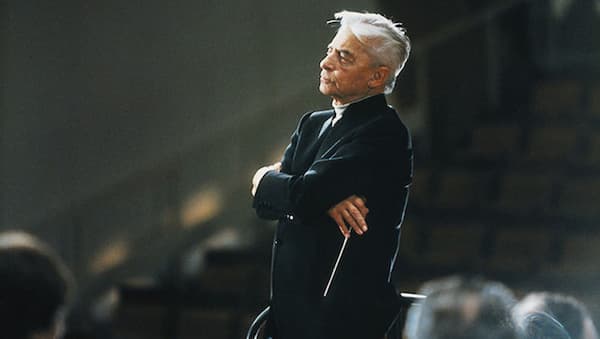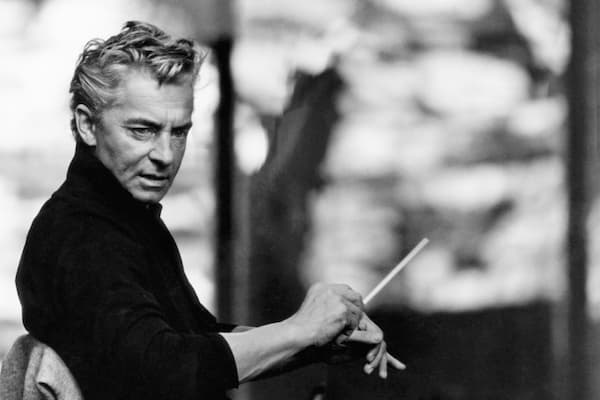Herbert von Karajan, hailed as one of the greatest conductors of orchestral music, exerted total authority and power. Known for his meticulous attention to detail, commanding presence, and a distinctive interpretive style, Karajan left an indelible mark on the world of classical music.

Herbert von Karajan © Siegfried Lauterwasser
Critics praised his emphasis on perfecting sound, and some called him the last great maestro. He served as the principal conductor of the Berlin Philharmonic for 35 years, transforming the ensemble into one of the world’s premier orchestras.
His recordings remain benchmarks for their technical brilliance and artistic depth, and he excelled in a wide range of symphonic works and opera, leaving behind a vast discography that continues to captivate audiences. To commemorate his birthday on 5 April, let’s sample some of his most iconic recordings.
Herbert von Karajan Conducts Mascagni’s L’amico Fritz “Intermezzo”
Beethoven Symphony No. 9
Karajan’s recording of Beethoven’s Symphony No. 9 with the Berlin Philharmonic is generally considered one of his most celebrated achievements. Exercising his interpretive prowess and technical command, Karjan captures the work’s monumental scope while showcasing his signature polished sound and dynamic control.
In his recordings and performances, Karajan approaches Beethoven’s Ninth with a blend of precision and grandeur, emphasising the work’s architectural coherence. His tempo choices were brisk and deliberate, reflecting his belief in maintaining momentum without sacrificing detail.
Critics and listeners alike have particularly praised his 1962 version for its balance of intellectual rigour and visceral impact, cementing it as a reference point and defining take on Beethoven’s final symphony. It is, without doubt, one of his most celebrated achievements.
Herbert von Karajan Conducts Beethoven’s Symphony No. 9 (excerpt)
Puccini Tosca

Herbert von Karajan, 1941
Karajan’s 1959 recording of Puccini’s Tosca with the Vienna Philharmonic is a landmark in operatic discography as it blends musical intensity with technical brilliance. Featuring a stellar cast, it showcases Karajan’s ability to fuse orchestral precision with theatrical drama. This recording remains a technical marvel and a testament to Karajan’s operatic vision.
Creating a vivid and emotionally charged interpretation, Karajan emphasises the lush lyricism and visceral drama, amplifying the opera’s emotional contrasts. At times, his tempi seem overly controlled, but his metronomic precision certainly keeps the singers on track.
The recording has been called a masterclass in operatic conducting, marrying Puccini’s raw emotion with a polished, cohesive sound. Musically, it balances verismo passion with structural discipline, while technically, it sets a high bar for stereo opera recordings of its era. The dramatic potency, vocal splendour, and sonic excellence make it an enduring icon in Karajan’s discography.
Giacomo Puccini: Tosca (Leontyne Price, soprano; Giuseppe Taddei, baritone; Giuseppe Di Stefano, tenor; Fernando Corena, baritone; Carlo Cava, bass; Vienna State Opera Chorus; Vienna Philharmonic Orchestra; Herbert von Karajan, cond.; Leonardo Monreale, bass; Piero De Palma, tenor; Herbert Weiss, treble; Alfredo Mariotti, baritone)
Mahler Symphony No. 9
Karajan’s 1981 recording of Mahler’s Symphony No. 9 with the Berlin Philharmonic is a pinnacle of his late-career achievements, widely regarded as one of his most profound and introspective interpretations.
Karajan immerses into Mahler’s complex and emotionally charged sonic world just eight years before his death. It showcases a conductor at the height of his powers, grappling with a work that explores themes of mortality, resignation, and transcendence.
Notable for its emotional depth and philosophical weight, the recording embraces Mahler’s ambiguity, balancing despair with moments of radiant beauty. His slow pacing in the “Adagio” has divided listeners. While some hail it as a revelatory exploration of Mahler’s farewell, others find it overly deliberate. It is, however, a definitive late-20th century rendition.
Gustav Mahler: Symphony No. 9 in D Major (Berlin Philharmonic Orchestra; Herbert von Karajan, cond.)
Wagner Ring

Karajan was considered a Wagner specialist, and his recording of “The Ring Cycle” with the Berlin Philharmonic is one of the most ambitious and celebrated interpretations of this monumental operatic tetralogy in the 20th century.
The recording reflects Karajan’s vision of Wagner as a symphonic dramatist, a conductor’s opera where the Berlin Philharmonic shines as brightly as the vocal cast. To be sure, Karajan blends technical mastery with a compelling, if refined, narrative arc.
Karajan’s Ring was initially met with mixed reactions. Admirers praised its lush sound, structural clarity, and modern sensibility, but critics found it overly polished and missing some of Wagner’s raw and primal energy. Nevertheless, its reputation has grown, with many critics now viewing it as a definite recording, rivalling Georg Solti’s interpretation with its orchestral brilliance and dramatic sweep.
Richard Wagner: Götterdämmerung (Twilight of the Gods) (excerpts) (Helga Dernesch, soprano; Berlin Philharmonic Orchestra; Herbert von Karajan, cond.)
Mozart Le Nozze di Figaro

Karajan’s interpretations of Mozart’s The Marriage of Figaro, recorded or performed live, are a sparkling and elegant take on this beloved opera buffa. He delivers brisk yet graceful performances that balance the opera’s comedic energy with its emotional depth.
His Figaro reflects Karajan’s mastery of the Classical repertoire, offering a polished, vibrant take that prioritises elegance over rustic humour. While some critics find it overly refined compared to earthier interpretations, its vocal splendour and orchestral brilliance have cemented it as an iconic rendition of Mozart’s masterpiece.
Karajan’s legacy as a conductor is defined by his extraordinary ability to blend technical precision with profound musicality. And he certainly produced a discography that remains a defining standard for its sonic richness and interpretive depth.
For more of the best in classical music, sign up for our E-Newsletter
Wolfgang Amadeus Mozart: Le nozze di Figaro (The Marriage of Figaro), K. 492 (Tom Krause, bass-baritone; Anna Tomowa-Sintow, soprano; Ileana Cotrubaş, soprano; José Van Dam, baritone; Frederica von Stade, mezzo-soprano; Jules Bastin, bass; Jane Berbié, mezzo-soprano; Heinz Zednik, tenor; Kurt Equiluz, tenor; Zoltan Keleman, bass-baritone; Janet Perry, soprano; Hermine Saidula, vocals; Vienna State Opera Chorus; Vienna State Opera Orchestra; Herbert von Karajan, cond.)
